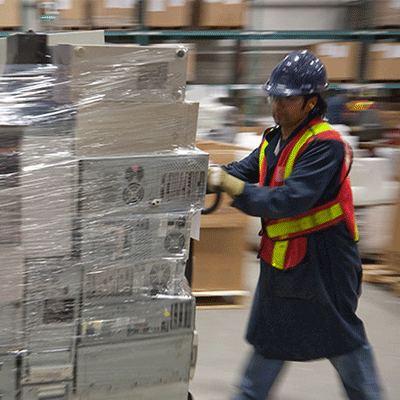 With every electronic device it recycles, Sims Recycling Solutions makes the protection of its workers, its visitors, and the environment a top priority. Regular audits serve as one measure of how well the company and its downstream vendors are doing that.
With every electronic device it recycles, Sims Recycling Solutions makes the protection of its workers, its visitors, and the environment a top priority. Regular audits serve as one measure of how well the company and its downstream vendors are doing that.
A company the size of Sims relies on multiple downstream vendors to not only fully process the plastics, metals, and glass found in the equipment it recycles, but also to properly manage the residuals that tag along, for instance, batteries, mercury bulbs, and printer toner. The only way to know what is actually happening to these materials is to track them from the beginning of the recycling process to the end.
This requires a team of qualified auditors to conduct audits each year to verify that these vendors provide safe and healthy workplaces for their workers, take the necessary steps to prevent pollution, and maintain the appropriate licenses and insurance to handle the material they receive. As a result, audits are comprehensive and require auditors to collect and track considerable amounts of information, including permits, financial documents, and verification of worker training.
But having the documents isn’t enough; the documents—and the information contained within those documents—must be readily accessible and easily tracked and updated by Sims employees working from any location. Recognizing this challenge, the company’s Original Equipment Manufacturer and Safety, Health, Environment and Community groups collaborated to build a new application that significantly streamlines the downstream vendor auditing process and information management conducted by the SHEC group.
Known as the Material of Interest Downstream Audit System, or MIDAS, this application automates what has largely been a manual process. The information gathered during an audit will now be entered into MIDAS and stored online, making it available to all Sims Recycling Solutions facilities. After a year in development and testing, MIDAS was recently made available to a limited number of internal users in Australia, the United Kingdom, and the United States.
“These audits are necessary for Sims to maintain its industry certifications and to meet the environmental, safety, and security expectations of our customers. We perform these downstream vendor audits to make sure the materials we send to them are being handled properly,” said Renee St. Denis, vice president of business development, Sims Recycling Solutions, Americas. “MIDAS ensures our audits are up-to-date, complete, and consistent.”
The centerpiece of MIDAS is an event scheduler, which makes it possible for auditors to find out the last time a downstream vendor underwent an audit, when the next one is due, and whether permits for that facility are about to expire. “Knowing when an audit was conducted, when the next one is due, and when permits will expire is knowledge that is critical to an effective auditing process,” said St. Denis. “With an integrated database housing this information, we know well in advance when an audit needs to be scheduled or a permit needs to be renewed and staying on top of the auditing process means staying compliant.”
The SHEC group estimates that MIDAS’s systematic and automated functions reduce by more than 80 percent the amount of time the external auditing team spends managing administrative tasks.
MIDAS has also automated the process of extracting downstream vendor data so Sims can provide this information to customers in a timely manner. “In the past this was a manual process that often took several days to compile,” said St. Denis. “Now we can provide even better tracking of customer material from the time it enters one of our facilities until it is fully processed, whether that’s by a first-, second-, or third-tier downstream vendor. This provides a clear picture to our customers of who is handling their material.”
Besides improved material tracking, St. Denis says, “MIDAS brings an unprecedented level of consistency, efficiency, and transparency to Sims Recycling Solutions’ audit procedures. This will allow us to demonstrate to our customers and third-party certifying bodies that all material that leaves a Sims facility is being handled in a responsible manner.”
